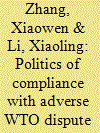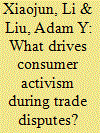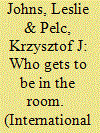| Srl | Item |
| 1 |
ID:
050910


|
|
|
| 2 |
ID:
143695


|
|
|
|
|
| Summary/Abstract |
Through a study of China’s wind turbine sector, this paper demonstrates how China liberally implements industrial policies and then removes them when the WTO disputes them. China’s convenient compliance with the WTO rulings reflects Beijing’s realpolitik navigation through the organization’s dispute-resolution process, rather than socialization to international norms.
|
|
|
|
|
|
|
|
|
|
|
|
|
|
|
|
| 3 |
ID:
079134


|
|
|
|
|
| Publication |
2007.
|
| Summary/Abstract |
Over the last three decades, the East Asian industry transfer has, via foreign direct investment (FDI), transformed China from an autarky into an integral player in the East Asian production chain. As a last-stage assembler in this value-added chain, China is maintaining an increasingly high trade surplus with the United States. The worsening U.S.-China trade disputes are addressed in such a politicized way that "fair" trade has become the central issue of bilateral trade consultation. However, due to its enormous labor force and impressive macroeconomic prospects, China will continue to play its current role as a world assembly center. Our statistical analysis further substantiates the theoretical hypothesis that the East Asian industry transfer has a strong export transfer effect. Therefore, it is unlikely that the U.S.-China trade imbalance will be alleviated fundamentally in the next five to ten years. Trade disputes between Beijing and Washington will continue to be a big headache and both sides need to tackle the problem through more dialogue and negotiation
|
|
|
|
|
|
|
|
|
|
|
|
|
|
|
|
| 4 |
ID:
127777


|
|
|
|
|
| Publication |
2014.
|
| Summary/Abstract |
Starting from 2004, China's trading partners, in particular the United States, have increasingly utilized the World Trade Organization (WTO) dispute settlement system (DSS) to challenge China's trade-related measures. As a major player in world trade, how China responds to adverse rulings is not only important to its trading partners, but also for the future of the international trade regime. China has thus far held a relatively good compliance record when facing adverse panel and/or Appellate Body rulings, except for the recent delay in full compliance in China-Publications and Audiovisual Products. Through examining the factors affecting China's decision making when targeted in a WTO dispute, this article finds that, in general, China is highly motivated to comply with the WTO DSS due to the reputational costs of noncompliance. Nevertheless, the recent delay in compliance in China-Publications and Audiovisual Products also demonstrates that successful implementation could be impeded by certain politically influential interest groups, especially when the measure at dispute is politically sensitive.
|
|
|
|
|
|
|
|
|
|
|
|
|
|
|
|
| 5 |
ID:
105895


|
|
|
| 6 |
ID:
178324


|
|
|
|
|
| Summary/Abstract |
What drives consumer activism during trade disputes? We investigate this important and timely question using a survey experiment in the context of the recent Canada–US trade dispute. We find that Canadians are more likely to express willingness to take punitive actions in the form of boycotting during a trade conflict when they learn that Americans are taking such actions (retaliation), when many fellow citizens are taking such actions (peer pressure), and when they are rallied by their government (elite cue). Among the three conditions, peer pressure has the largest effect. These findings contribute to our understanding of the microfoundations of consumer activism during international trade disputes. They also have important policy implications in a world where both protectionism and populism are rising.
|
|
|
|
|
|
|
|
|
|
|
|
|
|
|
|
| 7 |
ID:
133277


|
|
|
|
|
| Publication |
2014.
|
| Summary/Abstract |
Third parties complicate World Trade Organization (WTO) dispute settlement by adding voices and issues to a dispute. However, complainants can limit third parties by filing cases under Article XXIII of the General Agreement on Tariffs and Trade (GATT), rather than Article XXII. We argue that third parties create "insurance" by lowering the benefit of winning and the cost of losing a dispute. We construct a formal model in which third parties make settlement less likely. The weaker the complainant's case, the more likely the complainant is to promote third party participation and to settle. Article XXII cases are therefore more likely to settle, controlling for the realized number of third parties, and a complainant who files under Article XXIII is more likely to win a ruling and less likely to see that ruling appealed by the defendant. We provide empirical support using WTO disputes from 1995 to 2011.
|
|
|
|
|
|
|
|
|
|
|
|
|
|
|
|